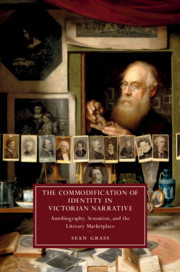Description
The Commodification of Identity in Victorian Narrative
Autobiography, Sensation, and the Literary Marketplace
Cambridge Studies in Nineteenth-Century Literature and Culture Series
Author: Grass Sean
An exploration of the commodification of autobiography 1820–1860 in relation to shifting fictional representations of identity.
Language: EnglishApproximative price 30.28 €
In Print (Delivery period: 14 days).
Add to cart
The Commodification of Identity in Victorian Narrative
Publication date: 09-2021
Support: Print on demand
Publication date: 09-2021
Support: Print on demand
Approximative price 107.80 €
In Print (Delivery period: 14 days).
Add to cart
Autobiography, Sensation, and the Commodification of Identity in Victorian Narrative
Publication date: 10-2019
296 p. · 15.8x23.5 cm · Hardback
Publication date: 10-2019
296 p. · 15.8x23.5 cm · Hardback
Description
/li>Contents
/li>Biography
/li>
In the first half of the nineteenth century autobiography became, for the first time, an explicitly commercial genre. Drawing together quantitative data on the Victorian book market, insights from the business ledgers of Victorian publishers and close readings of mid-century novels, Sean Grass demonstrates the close links between these genres and broader Victorian textual and material cultures. This book offers fresh perspectives on major works by Charles Dickens, George Eliot, Mary Elizabeth Braddon, Wilkie Collins and Charles Reade, while also featuring archival research that reveals the volume, diversity, and marketability of Victorian autobiographical texts for the first time. Grass presents life-writing not as a stand-alone genre, but as an integral part of a broader movement of literary, cultural, legal and economic practices through which the Victorians transformed identity into a textual object of capitalist exchange.
Introduction: life upon the exchange: commodifying the Victorian subject; 1. 'A vile symptom': autobiography and the commodification of identity; 2. 'Portable property': commodity and identity in Great Expectations; 3. Lady Audley's portrait: textuality, gender, and power; 4. Amnesia, madness, and financial fraud: ontologies of loss in Silas Marner and Hard Cash; 5. 'What money can make of life': willing subjects and commodity culture in Our Mutual Friend; 6. The Moonstone, sacred identity, and the material self; Conclusion: money made of life: the Tichborne claimant.
Sean Grass is Professor of English at the Rochester Institute of Technology and is the author of The Self in the Cell: Narrating the Victorian Prisoner (2003), Charles Dickens's 'Our Mutual Friend': A Publishing History (2014), and several essays on Victorian literature and culture. He received two awards from the National Endowment for the Humanities in support of the current work.
© 2024 LAVOISIER S.A.S.





